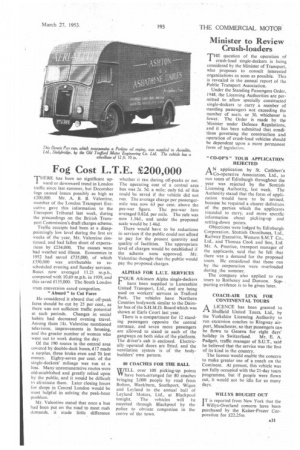Fog Cost L.T.E. £200,000
Page 33

If you've noticed an error in this article please click here to report it so we can fix it.
THERE has been no significant up ward or downward trend in London traffic since last summer, but December fogs caused losses possibly as high as £200,000. Mr. A. B. B. Valentine, member of the London Transport Executive gave this information to the Transport Tribunal last week, during the proceedings on the British Transport Commission's draft charges scheme.
Traffic receipts had been at a disappointingly low level during the first six weeks of the year, Mr. Valentine Continued, and had fallen short of expectations by £234,000. The causes were bad weather and illness. Economies in 1952 had saved £735,000, of which £350,000 was attributable to rescheduled evening and Sunday services. Buses now averaged 11.21 m.p.h., compared with 10.69 m.p.h. in 1939, and this saved £135,000. The South London tram conversion eased congestion.
"Absurd" to Cut Fares He considered it absurd that off-peak fares should be cut by 25 per cent., as there was not sufficient traffic potential at such periods. Changes in social habits had decreased evening travel. Among them Mr. Valentine mentioned television, improvements in housing, and the greater number of women who went out to work during the day.
Of the 190 routes in the central area covered by double-deck buses, 417 made a surplus, three broke even and 70 lost money. Eighty-seven per cent. of the single-deckers' mileage was run at a loss. Many unremunerative routes were old-established and greatly relied upon by the public, and it would be difficult to eliminate them. Later closing hours for shops in Central London would be most helpful in solving the peak-hour problem.
Mr. Valentine stated that once a bus had been put on the road to meet rush demands, it made little difference whether it ran during off-peaks or not. The operating cost of a central area bus was 2s. 5d. a mile; only 6d of this could be saved if the vehicle did not run. The average charge per passengermile was now 63 per cent, above the pre-war figure. The pre-war fare averaged 0.82d. per mile. The rate was now 1.34d., and under the proposed scale would be 1 46d.
There would have to be redactions in services if the public could not afford to pay for the present quantity and quality of facilities. The appropriate level of charges would be established if the scheme were approved. Mr. Valentine thought that the public would pay the proposed charges.
ALPHAS FOR L.U.T. SERVICES reOUR Atkinson Alpha single-deckers have been supplied to Lancashire United Transport, Ltd., and are being used on workers' services in Trafford Park. The vehicles have Northern Counties bodywork similar to the Daimler bus of the S.H.M.D. Board which was shown at Earls Court last year.
There is a compartment for 12 standing passengers opposite the central entrance, and seven more passengers are allowed to stand in each of the gangways on both sides of the platform. The driver's cab is enclosed. Electrically operated doors are fitted, and the ventilation system is of the bodybuilders' own pattern.
80 COACHES FOR THE BALL WELL over 100 picking-Up points YV have beendarranged for 80 coaches bringing 3,000 people by road from Bolton, Blackburn, Southport, Wigan and Leyland to the annual ball of Leyland Motors, Ltd., at Blackpool tonight. The vehicles will he escorted through Blackpool by the police to obviate congestion in the centre of the town.




















































































